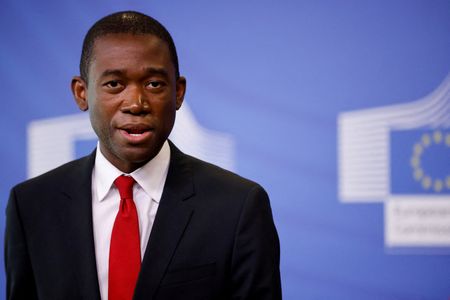WASHINGTON (Reuters) – U.S. Deputy Treasury Secretary Wally Adeyemo will travel to Asia this week for a two-day meeting with finance ministers from the Asia-Pacific region and bilateral meetings in Thailand and Singapore, the U.S. Treasury Department said on Tuesday.
Adeyemo, who has led work on U.S. sanctions over Russia’s invasion of Ukraine, will represent the United States when the Asian Economic Cooperation (APEC) finance ministers meet in Bangkok on Wednesday and Thursday, Treasury said. He will also meet with Thailand’s Finance Minister Arkhom Termpittayapaisith.
In Singapore, he will meet with Finance Minister Lawrence Wong, Trade and Industry Minister Gan Kim Yong, and Ravi Menon, the managing director of Singapore’s Monetary Authority, as well as business executives from the financial services, shipping and petroleum industries, Treasury said.
Throughout his trip, the department said Adeyemo would reaffirm the U.S. commitment to the Asia-Pacific region, while highlighting initiatives such as the Indo-Pacific Economic Framework (IPEF), which both Thailand and Singapore have joined. The newly relaunched G7 Partnership for Global Infrastructure and Investment (PGII) and U.S. efforts to build up supply chains with trusted partners were also on the agenda.
The visit comes ahead of the APEC leaders summit in mid-November and days after the United States unveiled a new national security strategy aimed at China and Russia, and as China continues to push to join the Comprehensive and Progressive Agreement for Trans-Pacific Partnership (CPTPP) trade pact.
Treasury said Adeyemo’s discussions would focus on efforts to combat climate change, and coordination of unilateral and collective responses to economic headwinds caused by challenges including the COVID-19 pandemic and the war in Ukraine.
“While the U.S. economy remains resilient in the face of these headwinds, the Deputy Secretary will work with partners to increase resilience in their economies,” it said.
Discussions would also touch on sanctions and export controls placed on Russia by more than 30 countries after Russia’s Feb. 24 invasion of Ukraine, and how a G7 price cap on Russian oil due to take effect on Dec. 5 will ensure market supply while lowering Russian oil revenues used to fund the war.
(Reporting by Andrea Shalal; Editing by Paul Simao)

